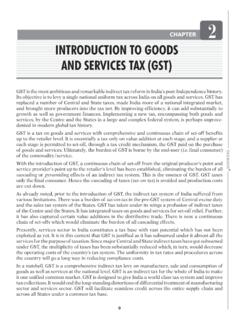Transcription of 1 Nature, Objective and Scope of Audit
1 TAXMANN - Meaning, Objectives and Scope of Audit Meaning of Auditan Audit is independent examination of financial information of any entity, whether profit oriented or not, and irrespective of its size or legal form, when such an examination is conducted with a view to expressing an opinion definition has the following implications: (a) Audit is independent examination. (b) examination is of financial information when the Objective is to express an opinion. (c) requirement of Audit applies in case of every entity, whether profit oriented or not (commercial entities or NGOs), whatever is the business size of entity (Small Size entity or large size entity), whatever is the legal form of the entity (proprietor, part-nership or company). Points to be ensured that not misled anybodyAuditor engaged to perform the task of performing Audit need to ensure the following: (a) Ledger balances agree with the entries made in the books of account.
2 (b) Sufficient and appropriate evidences are available for entries made in books of account. (c) all transactions are being recorded in books of account, there is no omission. (d) information contained in the financial statements is clear and unambiguous. (e) amounts shown in financial statements are properly classi-fied, described and disclosures are made in conformity with applicable accounting Standards. (f) financial statements reflect true and fair view of financial results and financial positionObjectives of Audit (a) the Objective of an Audit of financial statements, prepared within a framework of recognised accounting policies and practices and relevant statutory requirements, if any, is to enable an auditor to express an opinion on such financial statements. (b) The auditor s opinion helps determination of the true and fair view of the financial position and operating results of an enterprise.
3 (c) The user, however, should not assume that the auditor s opinion is an assurance as to the future viability of the enterprise or the efficiency or effectiveness with which management has conducted the affairs of the , Objective and Scope of AuditCHAPTER1taxmann 2 nature , Objective aNd Scope Of Audit (d) Auditor should review and assess the conclusions drawn from the Audit evidence obtained and from his knowledge of business of the entity as the basis for the ex-pression of his opinion on the financial of Auditorcovered in Sa 200 Scope of Auditthe Scope of Audit is determined by the auditor having regard to following: (a) Terms of the Audit Engagement (b) r equirement of relevant Statute. (c) pronouncements of the , the terms of engagement cannot supersede the requirements of statute or pro-nouncements of to be consid-ered in determining Scope of Audit 1.
4 Audit should cover the examination of all aspects of an entity relevant to financial statements. 2. a uditor should assess the sufficiency and appropriateness of the information contained in the accounting records and other source data. For this purpose, auditor should (a) evaluate accounting systems and internal controls (b) perform necessary tests, enquiries and other verifica-tion procedure of accounting transactions and account balances. 3. To determine whether the information is properly disclosed in the financial statements, Audit may involve (a) comparing the financial statements with the underlying records (b) considering the judgements used by management in preparing the financial statements. 4. Auditor is not expected to perform duties which fall outside the Scope of his competence.
5 5. Limitations, if any, on the Scope of Audit that impair the audi-tor s ability to express an unmodified opinion should be set out in his report. Aspects to be cov-ered in AuditExamination of Ac-counting System & Internal Control u To ascertain whether it is appropriate for the business and helps in proper recording of all the transactions. u To determine the nature , Timing and extent (Nte) of Audit procedures to be performed. Reviewing the sys-tem & procedures u t o find out whether they are adequate and comprehensive. Vouching of the transactions u To ensure authenticity and validity of transactions. u To check the arithmetical accuracy of the books of nature , Objective aNd Scope Of Audit 3 u To ascertain proper distinction into capital and revenue of As-sets & Liabilities u To ensure existence and valuation of the assets and liabilities appearing in the balance sheet.
6 Statutory Compli-ances u in case of entities governed by some law, rules or regulations, for example in case of Audit of a company incorporated under companies act, 2013. Expression of Opi-nion u On true and fair view of state of Affairs as reflected by balance Sheet. u On true and fair view of Financial results as reflected by Statement of profit and Loss. u On true and fair view of Cash Flows as reflected by cash flow Statement. Reporting on Other mattersas required by the law governing the entity. Important QuestionsQ. No. 1: The person conducting the Audit should take care to ensure that financial statements would not misled anybody. Describe briefly the points the auditor should ensure No. 2: The Objective of an Audit of financial statements, prepared within a framework of recognised accounting policies and practices and relevant statutory requirements, if any, is to enable an auditor to express an opinion on such financial State the objectives of Audit according to SA 200Q.
7 No. 3: List the points that merit consideration in regard to Scope of No. 4: State briefly six important aspects to be considered by an auditor while conducting an State the matters which the statutory auditor should look into before framing an opinion on accounts on finalisation of Audit of accounts. Discuss overall Audit State the principal aspects to be covered in an Audit concerning financial statement of account.[Nov. 15 (5 Marks)]Q. No. 5: The duties of the auditor are limited to verification of the arithmetical accuracy of the books of the account. - Types of AuditAudit required un-der law (a) companies governed by the companies act, 2013; (b) banking companies governed by the banking regulation act, 1949; (c) electricity supply companies governed by the electricity Supply act, 1948; (d) co-operative societies registered under the co-operative Societies act, 1912;taxmann 4 nature , Objective aNd Scope Of Audit (e) public and charitable trusts registered under various religious and endowment acts; (f) corporations set up under an act of parliament or State Legislature such as the Lic of India.
8 (g) Specified entities under various sections of the income-tax act, Audits u a udits of the accounts of proprietary entities, partnership firms, Huf, etc. u in respect of such entities, there is no basic legal requirement of Audit . Many of such enterprises as a matter of internal rules require Audit . u Some may be required to get their accounts audited on the directives of Government for various purposes like sanction of grants, loans, etc. u But the important motive for getting accounts audited lies in the advantages that follow from an independent professional Audit . Important QuestionsQ. No. 6: Discuss the types of audits required under law. [Nov. 11 (5 Marks)] - Advantages of Audit of Financial Statements 1. Protect the interest of fund providersit safeguards the financial interests of persons who are not associated with the man-agement of the organisation partners or shareholders.
9 2. Moral check on em-ployeesit acts as a moral check on employees from committing defalcations or embezzlement. 3. Settlement of Taxes, statements of accounts are helpful in settling of taxes, negotiating loans and for determining the purchase consideration for a business. 4. Settlement of Trade Disputesaudited statements are useful for settling trade disputes for higher wages or bonus. 5. Detection of Wast-agesAudited statements also help in detection of wastages and losses and shows the different ways by which these might be checked especially those that occurred due to absence or inadequacy of internal checks or internal control measures. 6. Proper mainte-nance of books of accountindependent Audit ascertains whether the necessary books of account and allied records have been properly kept and helps the client in making good deficiencies or inadequacies in this respect.
10 7. Appraisal of con-trolsAs an appraisal function, Audit reviews the existence and operations of various con-trols in the organisations and reports weaknesses, inadequacies etc. 8. Admission/retire-ment of PartnerAudited accounts are of great help in the settlement of accounts at the time of ad-mission or death of the partner. 9. Grant of LicenseGovernment may require audited and certified statements before it gives assistance or issues the license for a particular QuestionsQ. No. 7: What is the importance of having the accounts audited by independent professional auditors?[May 01 (8 Marks)]Or What are the advantages of Independent Audit ? [May 12 (8 Marks)]Or Discuss the following: Advantages of Independent Auditor. [May 15 (5 Marks)]taxmann nature , Objective aNd Scope Of Audit - Inherent Limitations of Auditas per S a 200 Overall Objectives of the independent auditor and the conduct of an Audit in accordance with Standards on auditing the auditor is not expected to, and cannot, reduce Audit risk to zero and cannot therefore obtain absolute assurance that the financial statements are free from material misstatement due to fraud or error.














